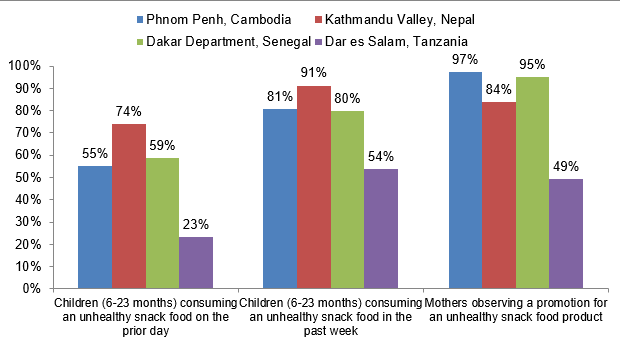Unhealthy snack foods and beverages as a human rights issue
Recently, a United Nations expert warned that unhealthy snack foods and beverages are a human rights concern. In a new report, Hilal Elver, the U.N.’s special representative on the right to food, said that the rise of industrial food production combined with trade liberalization has allowed large corporations to flood the global market with cheap, nutrient-poor foods that force poor people to choose between economic viability and nutrition, effectively violating their right to adequate food.
Overconsumption of unhealthy snack foods and beverages are particularly harmful to children under two, who need a variety of healthy foods to grow and thrive. Such foods could take the place of vital nutrients—putting young children at risk not only of malnutrition, but also of developing obesity and chronic diseases later in life.
Elver said that aggressive promotion of such unhealthy foods to children and developing countries is particularly concerning. She called on countries to regulate the food industry and enable healthy eating.
“Within the human rights framework, States are obliged to ensure effective measures to regulate the food industry, ensure that nutrition policy-making spaces are free from private sector influence, and implement comprehensive policies that combat malnutrition in all its forms and create healthy eating environments,” said Elver.
ARCH research shows extensive promotion and consumption of unhealthy snack foods and beverages among children
Recent studies in Africa and Asia, conducted as part of Helen Keller International’s Assessment and Research on Child Feeding (ARCH) project, show how widespread the promotion and consumption of unhealthy snack foods can be. For example, a study in Nepal’s Kathmandu Valley revealed that it is very common for young children to eat commercially produced cookies, candy, and chips. Nearly three-fourths of children between the ages of 6 and 23 months ate such snack food products in the previous day. Also, more than 85 percent of their mothers saw promotions for these foods.
At the same time that unhealthy snack foods are widely consumed, Nepalese children are not getting enough healthy foods to eat. The ARCH study revealed that only half of children 6 to 23 months of age ate the recommended amount of diverse, nutritious food needed for healthy growth and development.
No matter where a child lives, unhealthy snacks can have the same harmful result. When children eat unhealthy snacks, they have less room in their small bellies for vital nutritious foods. And when families spend money on these snacks, they may have less money available for healthy foods.
The prevalent marketing and consumption of unhealthy snack foods and beverages is a global trend; ARCH studies have shown extensive promotion and consumption of unhealthy snack foods in urban areas in Cambodia, Senegal, and Tanzania. The table below shows the percentage of children in ARCH studies who ate unhealthy snack foods and the percentage of mothers who saw promotions for these snacks.
ARCH studies reveal high levels of promotion and consumption of unhealthy snack foods in urban areas
What can be done to combat unhealthy snack foods and beverages?
According to Atul Upadhyay, ARCH’s Nepal Country Coordinator, one way to improve child health and nutrition is to promote nutritious, convenient, and affordable alternatives to unhealthy snacks. National health and nutrition stakeholders can work together to encourage healthy foods and dissuade families from feeding their children snack foods high in sugar and salt, he said. He also recommends enacting national policies and standards to regulate the promotion of unhealthy snack foods and beverages.
“Encouraging healthy meals and snacks and restricting the promotion of unhealthy snack foods to young children will go a long way toward improving child health and nutrition in Nepal,” Upadhyay said.
The benefits of adequate nutrition during the first 2 years of life can last a lifetime. Efforts to improve nutrition and diets among young children can help combat malnutrition in childhood and lowers the risk of obesity and non-communicable diseases later in life. Ensuring caregivers of young children have access to healthy, affordable snack options and are free from harmful marketing that encourages use of unhealthy snack foods is vital to protecting nutrition of children globally.
Learn more
Access ARCH’s research findings on unhealthy snack foods.


